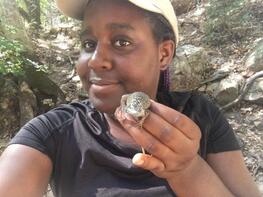 Earyn McGee in the field. Earyn McGee in the field. 7/29/2020 by Marsha Walton AAAS Herpetologist and University of Arizona Ph.D. candidate Earyn McGee’s research has her well prepared for obstacles like oppressive heat, treacherous terrain and even venomous animals. Her field research takes her to the Chiricahua Mountains of southern Arizona, where she’s determining the effects of stream drying on lizard communities for her doctorate research in conservation biology. This enables McGee a closeup look in studying lizards and their diet, and how the climate crisis may be altering it. She and the undergraduates she works with must first deftly catch the reptiles, weigh and measure them, then document their sex and overall health. It is demanding and unpredictable work. And it has sometimes been made riskier by unsettling encounters with police, whose actions imply that, as a young scientist of color, she does not have a right to conduct her field studies. “Where I work is pretty remote,” says McGee. “A lot of the time, it's Border Patrol, or some form of law enforcement stopping us [from working]. Last year, we had these military guys follow us into our site. A couple of days prior, we were out in the group with a whole lot of white people, we didn't have that same type of surveillance in the same exact spot,” says Already well known as a science communicator on social media, McGee counters such racist incidents with the message that the natural world belongs to everyone to love and to protect. And she stresses that excitement for nature can come at any point in time, whether hiking through a National Park or looking up at a tree in New York City. Her courage in speaking out went viral shortly after a white woman made racist threats against Black birdwatcher Christian Cooper in Central Park on May 25, 2020. McGee and several colleagues, who had already been communicating about academic and diversity issues, sprang into action. They created #BlackBirdersWeek. Photos and experiences soon flooded social media from all over the world. In interviews and podcasts during the week (May 31-June 5), scientists and naturalists shared examples of Black people, from birders to hikers to photographers, enjoying nature and outdoor spaces. The Central Park incident of racism, and the Twitter and Instagram responses to it, became another visible, widely shared facet in what’s become known as the U.S. Civil Rights racial injustice reckoning of 2020. Besides her activism aimed at adults, McGee also shares her knowledge about wildlife conservation with a younger audience. Lizards may be small, she says, but they can also be very swift and very clever. “[Catching] them the first time, depending on the lizard, can be relatively easy. But that next time when they see you coming, they're like, ‘Oh no, not this again,’ and they take off running,” she says. And she has some stories of these types of experiences she often shares on her social media accounts. “So I'm running after this lizard, sprinting. This lizard is really putting up a good chase. I'm hopping over logs and rocks and stuff. I caught her, but before I did, I took a picture and I told people on Twitter the story of what happened,” says McGee. Her followers were intrigued by the elusive lizard story. Since June 2018, thousands of curious students and adults regularly scour the photos on her informal Twitter quiz, using the hashtag, #FindThatLizard. After locating the reptiles, McGee then shares details about their camouflage, eating habits and survival skills. She’s heard from many science teachers who now start their classes off with this quest. McGee says lizards are an easy sell to get kids hooked on science. In her outreach work, she shares fun facts about lizards, such as some lay eggs, some give live birth, others can even clone themselves. And what’s not to love about a Gila monster, asks McGee? “People pay money to come from all around the world for the hope of seeing this lizard (the Gila monster). It's one of few venomous lizards in the world, and compounds from its saliva have been used to create medical treatments for diabetes. So, lizards are cool,” she says. McGee’s activism and fearlessness led to her recognition as one of the younger AAAS IF/THEN® Ambassadors. In her role as an ambassador, McGee shares with young girls her expertise on the power of social media for women and underserved minorities in STEM fields. She also hopes to introduce young girls to career paths in natural resources. Still, McGee knows other types of outreach are needed to improve diversity and equity in STEM. While she says there is currently a lot of activism on her own campus to combat racism and xenophobia, McGee says institutions need to do more to assist Indigenous Mexican-American and undocumented students. When her studies are complete in about a year, McGee plans a career as a science communicator, perhaps hosting a nature show on TV. And her quest for social justice will stay closely tied to her career path. “I really want to be able to create pathways for Black, Indigenous, other people of color to enter into natural resources fields, and even if they don't want to do it as a job, maybe find it as a new hobby. So that's really what I hope to accomplish in the future,” said McGee.
0 Comments
Your comment will be posted after it is approved.
Leave a Reply. |
Have a blog or blog idea?
Let us know (click) Other Blogs
VA Native Plant Society - click Brenda Clement Jones - click John Muir Laws' Blog - click Megan's Nature Nook - click Categories
All
Archives
September 2023
Blog Administrator:
Kathleen A. VMN since 2018 |